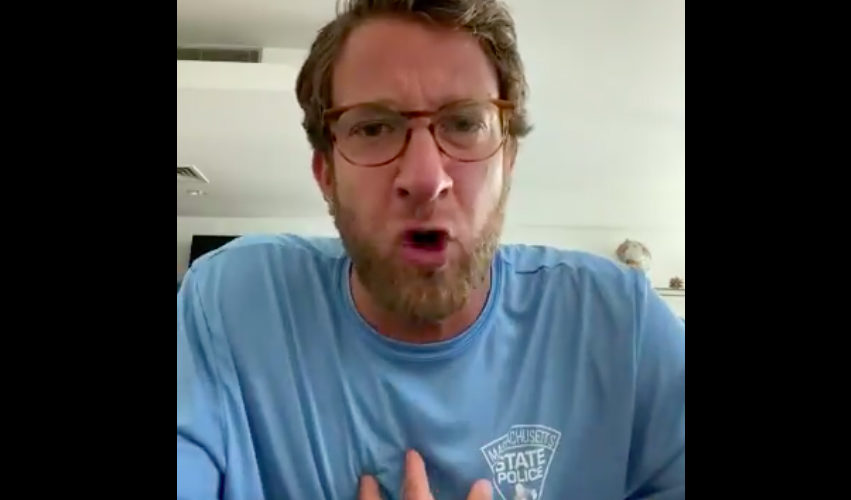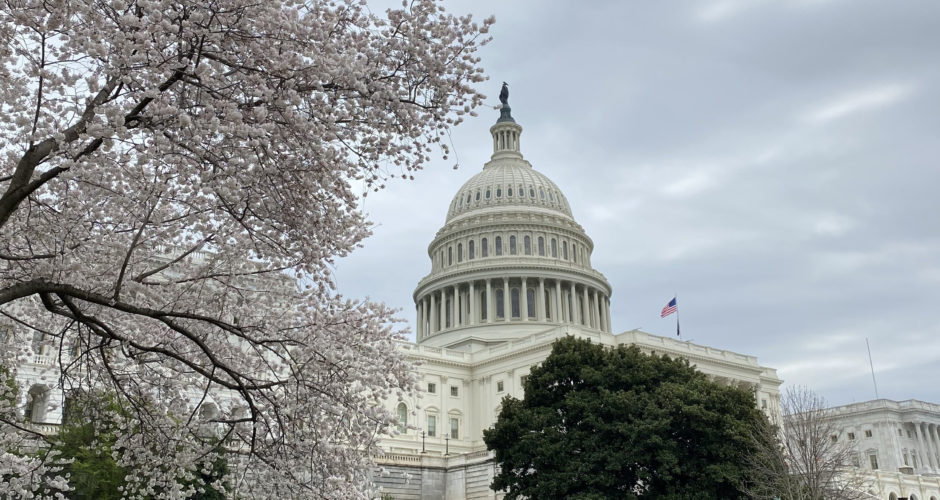
Laura Ingraham/Molly McCann Fauci Flips On Masks

The Federalist/Mandatory Masking Is About Social Control
Published by The Federalist on May 27, 2020.
On May 26, Virginia’s Gov. Ralph Northam announced that wearing masks outside one’s home will be mandatory effective May 29. He first hinted he might issue a masking order a week ago, likely to test the water.
A new refrain in public discourse is growing in volume by the day: “Things will never be the same.” The certainty with which we are assured of this pre-determined future is perplexing. Whether or not “things” will ever be the same is not at all clear, but that some people hope things will never be the same is certain. To those looking to benefit politically from emergencies, COVID presents an opportunity to advance plans targeted to transform American freedom and the American way of life. Mandatory-masking policies provide a valuable foundation to weaponize the virus against American liberty—now and in the future.
Much of our freedom is maintained by the collective resistance of the American mood. When the Minnesota governor excluded churches from his Phase I reopening plan, the Catholic and Lutheran leadership announced, through counsel, that their churches would reopen with or without the state’s blessing.
The governor’s resulting about-face was probably not due to a legal epiphany. Rather, he understood he’d pushed the envelope too far. Minnesotans wouldn’t put up with any further abuse of their religious freedoms.
Would Virginians, outside of the blue D.C. suburbs, be willing to accept a masking order? To take our freedom from us, people with anti-American agendas have to mobilize some initial quorum of consent from the population.
Mandatory masking seeks to build that consent. In addition to extending the fiction that we are in an emergency sufficient to trigger the extra-constitutional authority of local and state executives, mandatory masking acts as a peer pressure-fueled signal that encourages conformity to our coming “new normal.”
An April 18 article in the Washington Post underscores the strategy, presenting the mask controversy as a left versus right debate. People resisting mandatory mask policies are, per usual, painted as unreasonable, headstrong, and backward—displaying ignorant American bravado while rejecting science and good sense. (That caricature is itself a tool to mock, marginalize, and silence dissent.)
The most telling passage of the article is this one:
For Trump’s supporters, declining to wear a mask is a visible way to demonstrate “that ‘I’m a Republican,’ or ‘I want businesses to start up again,’ or ‘I support the president,’ ” said Robert Kahn, a law professor at the University of St. Thomas in Minneapolis who has studied Americans’ attitudes toward masks. “Masks will quickly become the new normal in blue states, but if social distancing continues through 2022, the mentality among Republicans could well change, too: If I can go to work and the cost of marginal improvement in my life is wearing a mask, maybe Americans of both parties do accommodate ourselves to it.”
And that’s the key. If we want to marginally improve our lives, we will submit. The masks, aren’t the endgame. The point of the masks is to teach the American people that if we want to get some sense of normal, we have to accept an abnormal normal.
If everyone is wearing a mask, it telegraphs a society-wide acceptance that the status quo has changed, and with that consensus other changes can come, too. Society will be primed to accept measures that most normal Americans would reject in any other time. Our new normal will include a permanent expansion of the bureaucracy and alarming new COVID-related regulations.
The truth is you aren’t irrational or obdurate if you are skeptical about masks. The “experts” have admitted that masks’ efficacy is usually negligible. Dr. Anthony Fauci himself, in a “60 Minutes” interview early in this pandemic, dismissed masks as essentially useless.
“There is no reason to be walking around wearing a mask. When you are in the middle of an outbreak, wearing a mask might make people feel better, and might even block a droplet,” he said with almost an eyeroll, “but it’s not providing the perfect protection people think it is, and often there are unintended consequences…”
Fauci may have changed his tune, but plenty of sensible doctors are still speaking up. Last week, a doctor in the Wall Street Journal pointed out that cloth masks—the type worn by the overwhelming majority of the population—are not very effective, echoing Fauci’s earlier admission. The WSJ author noted that even the N95 masks fall short: “They’re considered effective at blocking coronavirus particles only when they’re form fitted and tested to make sure there isn’t any leakage.”
In short, cloth masks are largely symbolic. The science hasn’t changed, but the agenda has.
Implementing mandatory mask policies across a society of 300 million because it makes some people feel better is absurd on its face. But the policy makes a lot of sense if you understand its purpose and usefulness to shift the American mindset.
The Post inadvertently summarized the game. Mandatory masks are a critical predicate to current and future abuses to our liberty. Mandatory masking provides the foundation on which state and local governments continue to justify emergency measures and rule-by-executive-fiat, and it creates a national mood of consent that America will accept suspect indefinite government expansion because we face a “new normal.”
Photo: Russ Allison Loar

The Federalist/How We Morphed From A Free State To A Quasi-Police State – And How To Roll It Back
Published on The Federalist, May 18, 2020
Several days ago, Dave Portnoy—an internet personality and the founder of a popular sports blog called Barstool Sports—released a three-minute video in which he vigorously ranted against the ongoing lockdowns. Portnoy’s basic point was that the goalposts have shifted from flatten the curve to find a cure, and he pointed out, in blunt and colorful language, that economic suicide in pursuit of the latter goal is pure insanity. His video went viral. Portnoy is not a political figure. His anger over the current economic crisis and his sense that, having done our best to slow the spread, we have the right to take a risk to survive, resonates with a lot of normal people. One of Portnoy’s repeated questions throughout the video was, when did this happen? When did we go from flattening the curve to tanking our economy, our livelihoods, and our futures? When indeed.
Last night on Tucker Carlson, Andrew Napolitano offered a related reflection when he described a free state as “one where the laws are written to uphold personal liberties,” while the definition of a police state is “one where the laws are written, legitimately or not, to uphold what the government wants.” He went on to note that there has been a transition in America that has not been gradual: “In a period of six weeks we have gone from a free state . . . to a police state.”
Alarming as it is, Napolitano is right. While COVID is an obviously serious and frightening virus, our leaders (and many fellow Americans, too) seem oblivious to the destruction we are self-inflicting on our economy and on millions of American lives. The bureaucrats and local would-be dictators concocting their various plans to protect us all from each other have to be relieved of their power or the police state will be permanent. So how did we get here, and how do we reclaim our liberty and the right to take risk to survive?
We got here because, as a nation, we agreed to the lockdowns in the first place. In late March and early April, as the virus was spreading in densely populated American cities and horror stories were pouring out of Lombardy, Italy, the mood among Americans shifted. Lockdowns started in coastal states where the threat felt most immediate, and all but swept the nation shortly thereafter. The lockdowns happened, though, because the national mood, as intangible as that sounds, favored the lockdowns. Politicians knew that they could call on their emergency powers and impose the restrictions because they knew they would not meet resistance. Collectively, we consented.
Do not underestimate the power of a national mood. Wars have been won and lost based not on the military might of a nation so much as the will of its people to either prevail or to fold. Nowhere is the spirit of a people more a force to be reckoned with than in America where freedom and individual autonomy are part of our DNA. This invisible force is a very real influence in politics, and many constitutional abuses have never been attempted over the years, not because they were unconstitutional, but because politicians and leaders understood the actions would not be tolerated. In some sense, we are free because we choose to be free.
We did consent to the lockdowns and now are suffering under the insanity that has flowed from them—economic suicide and petty local laws that serve no purpose other than to nanny us into submission. So how do we muscle out of our bind? How do we return from the police state we have become to the land of liberty that we enjoyed a mere three months ago?
One answer is certainly that we must enforce our constitutional rights by challenging the myriad overreaches in court. That is a critically important effort and just the type of pushback I have applauded for many weeks now. But, in tandem to that effort, and really prior to it, we have to shift the mood again.
Not everyone seething about the ongoing abuses by local potentates is going to file a lawsuit, but everyone can contribute to a shift in the national mood. When people honestly express to others their opposition to continued lockdowns, the sentiment spreads and the “mood” strengthens. Portnoy’s video went viral not just because he is a popular guy; it went viral because it gave voice to people who weren’t sure their gut reactions were “acceptable” and to people who felt encouraged by seeing someone with whom they identified step up and voice opposition. We all need to step up and speak out. Everyone has a zone of influence, large or small, and when you speak, you add to a critical growing momentum.
At the end of the day, we lose freedom because we let bad people take it from us. Freedom is not taken by force only; it is often taken slowly and quietly, with our foolish consent that is given by silence.
America was not founded to be a police or nanny state; it flourished because it was the land of the free and the home of the brave. It grew to greatness because people were willing to take risks to survive and succeed. The will of the American people is not just a political platitude—it is a tangible and powerful force for freedom when properly activated. If we want to roll back the abuses—if we want to break the police state and reclaim our livelihoods, our futures, and our political autonomy—we all have to affirmatively contribute to a new national mood.

Human Events/Feminism’s Fraud on Women
Feminism is perhaps the most popular modern philosophy that almost none of its proponents understands or can explain. Even a relatively cursory interaction with feminists reveals that the rank-and-file, the foot soldiers of feminism today, do not know or understand their own philosophy. They do not see that feminism is directly opposed to what most of them already enjoy or are seeking—loving spouses, healthy children, and happy homes. In a twisted irony, women today are being duped into supporting a movement that seeks to erase the differences between genders and ultimately destroy traditional families.
To understand feminism is not hard, because its principles were set forth in detail by its three founding members, beginning with the leader of the ideology: Simone de Beauvoir. De Beauvoir penned The Second Sex, a nearly 1,000-page tome now popularly dubbed “the Feminist Bible.” The book itself wanders chapter after chapter displaying De Beauvoir’s obvious intellect and facility for words, but also her deeply deformed view of love, marriage, and heterosexual sex.
De Beauvoir was a conflicted character. She wrote that the act of sex, by its nature, is violent and debasing to women, yet she maintained an open sexual relationship with a man—Jean Paul Sartre. De Beauvoir claimed she wanted to liberate women from their unhappy lot, yet seduced a number of young, vulnerable girls whom she was teaching at the Sorbonne, before introducing them to Sartre so that he could seduce them as well. De Beauvoir and Sartre exchanged many letters detailing their sexual exploitations and ruthlessly mocking the subjects of their conquests.
The other two founding mothers of feminism were no less disenchanted with stable, heterosexual relationships. Betty Friedan, author of The Feminine Mystique, walked out on her husband and children, and campaigned for feminism and the ERA for the rest of her life. Kate Millett, author of Sexual Politics, was a lesbian and by accounts of her family, a very unhappy woman.
To be clear, Betty Friedan claims she was abused by her husband (although her husband is now attempting to refute that allegation) which if true, is tragic; and being a lesbian does not make one a bad person. What is clear, though, is that from De Beauvoir, to Friedan, to Millett, feminism is the brainchild of women who had a warped view of marriage and rejected marriage as a societal good. Indeed, “the Patriarchy,” against which so many preppy millennials now clamor, was clearly defined by the founding feminists. Kate Millett said, “Patriarchy’s chief institution is the family.”
It is absolutely baffling that so many modern women have adopted the principles and beliefs of these three figures. If I wanted to get advice on how to be the finest attorney possible, it would be silly to go ask a medical doctor for tips. Instead, I would look for someone in my own profession who has excelled in the field in which I aspire to achieve. Feminism is the philosophy of women who rejected, in one way or another, and targeted for extermination, the very lifestyle that the super-majority of modern feminist women ultimately aspire to attain: marriage, children, and a happy home life. It is entirely irrational to support and promote feminism, because it seeks the destruction of your own way of life.
This complete disconnect from the reality of what feminism really means and what it seeks to accomplish is on awkward display when prominent feminists like Emma Watson publicly grapple with the dissonance in the philosophy they espouse. In 2014, Watson delivered an address to the United Nations to launch the UN’s HeForShe campaign, an initiative that is meant to enlist men in the fight for “gender equality.” Watson’s speech was hailed as explosive and Vanity Fair declared it a “game-changing speech for Feminism.” In some of her opening comments, the actress noted:
“I decided I was a feminist and this seemed uncomplicated to me. But my recent research has shown me that Feminism has become an unpopular word. [T]he more I have spoken about Feminism the more I have realized that fighting for women’s rights has too often become synonymous with man-hating. If there is one thing I know for certain, it is that this has to stop…”
It won’t stop. The taint of man-hating cannot be expunged from the feminist movement, because it is the core of true feminism. Anyone who has read the clearly stated beliefs of feminists and the philosophy that is feminism knows that it is fueled by a smoldering anger against the biological differences that make women more physically vulnerable than men, that assign to women the “drudgery” of child-bearing and child-rearing, and indeed self-disgust of the very ethos of true femininity.
Feminism has survived and even thrived, because the rank-and-file do not seek or demand a complete understanding of the philosophy. Today, we have an entire generation of young American women who no longer can articulate a cogent explanation of their beliefs. They cannot explain in any kind of depth what feminism has accomplished or how it will bring about the change they desire. Modern feminists cannot even agree on what feminism means. The majority identify amorphous notions of feminine strength and independence as core values of feminism. There is a bit of a Wonder Woman-fandom flavor with a dash of Handmaid’s Tale to most feminists’ conceptions of feminism—both tales as fantastical and mythical as today’s modern conception of feminism.
In direct contradiction to feminist philosophy, most of the young women who wave the Wonder Woman flag while championing “Feminism,” are also in search of love. They criticize gender stereotypes, yet hope for a strong and faithful partner; they promote radical self-reliance, yet seek a relationship that will last “till death do us part;” they rage against the Patriarchy, but envision healthy and stable homes in which to raise their children. They yearn for all the fundamental societal ideals that true feminism hopes to destroy.
Feminism has not changed. It has not evolved with a new generation to mean something less radical or less destructive than that pushed by De Beauvoir and her intellectual progeny. Instead, feminism today takes advantage of the widespread ignorance—the lack of any true understanding of the ideology—to rally women to support concrete political action that will enshrine actual, radical feminism in the Constitution. The women who really understand the agenda co-opt the majority’s super-hero fantasies into energy and traction for the true political dogma.
Young would-be feminists would do well to explore the foundations of feminism, and learn what the icons of the movement believed and planned to accomplish. Feminism is not a general term for girl-power or independence; it does not change based upon the subjective opinions of the women who have adopted feminism as a pet cause. It was formed by intelligent women who loathed something in themselves and about themselves that most of us, no matter our ambitions or career paths—doctors, homemakers, lawyers, working-moms, teachers, CEOs, students—prize and cherish. Feminism seeks the destruction of a way of life—family life—and it hopes to erase every distinction between men and women—distinctions we have celebrated and appreciated throughout human history and across cultures.
Feminism is a fraud—don’t be one of its victims, and don’t let it destroy the lifestyle most women would like the option to pursue, now or in the future.
Human Events published an edited version of this post in May of 2019.
Picture by Ithmus, Flickr.

Lockdowns Are Local…And Need To Be Challenged
This morning, The Washington Post ran an article about plans that are being made to reopen the economy. The article complains that state governors (rather than the White House) are leading the planning, which has resulted in a “mind-boggling level of disorganization,” according to a CDC director. The incessant bleating of prominent health leaders over the lack of federal control in this crisis only serves to underscore how little they understand or respect this country’s Constitution and the freedom it seeks to protect. Although the White House certainly has emergency authority to mandate all number of efforts to respond to crisis, and obviously can bring pressure to influence local leaders, the coronavirus has highlighted the structural nature of the Constitution and that one of the saving graces in the insanity we are living through is that lockdowns are local.
Our country’s structure is pretty straight forward on paper, even if things get a little complicated once all the parts start moving in real time. When the states formed the Union, they ceded power to a federal government cautiously, carefully granting to Congress enumerated powers and creating checks and balances to keep the federal government from evolving into tyranny—at least that was the plan.
The states, for their part, retained their historic “police power.” The police power is a state’s inherent authority to govern with a view toward its citizens’ health, safety, morals, and general welfare. Certainly, a state’s plenary powers are limited by the U.S. Constitution and state constitutions, but absent those restrictions, a state’s power is very broad.
Ordering lockdowns, then, is within the state’s authority, not that of the federal government. Bill Gates, Dr. Fauci, or anyone else advocating for a federally mandated lockdown either doesn’t understand our Constitution’s structure or doesn’t respect it.
On the federal level, emergency measures—no matter how necessary—always pose a danger to freedom. Historically, the exercise of authority triggered by an emergency brings to life a new federal power that never returns to the fully dormant posture from which it came. (I’d go further and say the power is created, but we maintain the ruse that it was always there and never exercised.) If you need an example of radical change in federal authority brought about by an emergency, look no further than FDR’s response to the Great Depression.
A state’s exercise of its police power in a time of crisis can be very frightening, too. I find our current lockdowns particularly chilling. They effectuate a sweeping deprivation of civil liberties and, in my opinion, many of the current lockdowns far exceed the uncontroverted evidence necessary to justify them.
This is one reason it is much better to have emergency powers exercised at the local level, where citizens can better control the leadership making the decisions. If lockdowns have to be implemented jurisdiction by jurisdiction, or state by state, they can’t be imposed with the same uniformity and force, and there is the option for a state to dissent and chart its own path, as Florida’s Gov. DeSantis did for some time. This is essentially the “laboratory of the states” at work, as Justice Louis Brandeis wrote: “It is one of the happy incidents of the federal system that a single courageous State may, if its citizens choose, serve as a laboratory; and try novel social and economic experiments without risk to the rest of the country.” DeSantis got a lot of grief for bucking the trend and attempting to find less restrictive means of securing his state short of house-arrest, but he had every right (perhaps even a constitutional duty) to do it.
Local control also means it is easier to correct overreach. It is easier for the people to hold state leaders accountable if and when emergency powers are abused, than to fight the federal government.
This week we have seen multiple lawsuits crop up across the nation as citizens balk at draconian enforcement measures. In North Carolina a group of homeowners have filed suit against local leaders who are blocking their access to their vacation homes on the Outer Banks. Former Governor Mike Huckabee is one of several homeowners in Florida suing because they have been told they cannot use the private beaches at their oceanfront properties. In Greenville, Mississippi, police issued churchgoers $500 tickets for sitting in their cars at an outdoor service—the churchgoers are suing. In Kentucky, the governor has announced law enforcement will record the license plates of anyone showing up to a mass gathering and then transmit that information to the health officials who will order a 14-day quarantine of those persons.
It is good to see these lawsuits emerging, but we need to collectively start objecting to statewide lockdowns, too. The herd mentality that has swept the nation and imprisoned Americans across the country does not have the proper evidentiary basis, and the precedent, if left unchallenged, can and will be abused in the future. Public outcry should be widespread and loud. Although the President doesn’t implement the lockdowns, he has tremendous leverage to encourage or discourage them. The President is under tremendous pressure to keep the country closed and needs (and wants!) to hear that freedom conscious Americans support his best instincts. Worried Americans should be supporting the President and governors to reopen the economy on May 1st.

Mom’s Successful Surgery
My mom underwent surgery yesterday to remove the sarcoma tumor in her ankle. The final two rounds of chemo accomplished more than we thought they would, and her doctor was very pleased to tell her that he had saved her leg from amputation. We were all very pleased to hear that! 🙂
I came home in time to spend a few days with Mom before her surgery. She has recovered so well from her scare just two weeks ago, and she was able to walk and enjoy the beautiful spring weather with us all.
Her surgery went smoothly, but she was very slow to wake up. Due to the coronavirus, only one person could go with Mom to the hospital, so my poor dad spent all day waiting for her to come around. It was a long day, but certainly a blessed one.
We still don’t know the status of the spots on her lungs, and of course we have to wait and pray that the cancer hasn’t metastasized, but for this moment she has successfully cleared quite a hurdle.
Thank you for your prayers, texts, and emails. We are so grateful for the love and encouragement, and I know that your prayers have propelled us to this successful surgery.

Legitimate Fear in the Face of Shutdown
The predominant fear of 9/11 stemmed from our sudden and violent realization of national vulnerability. America was supposed to be an untouchable safe zone despite the unpredictability of the rest of the world, yet suddenly we were brutally wounded and wondering where the next blow would fall. America was on her knees, confused and hurting, facing an aggressive (and to the average American) unknown enemy.
Yesterday, I flew from Washington, D.C. to Saint Louis, Missouri. When my plane took off, it raced up the runway at Reagan National past cluster after cluster of empty jetways. As we lifted up over the bridge and the Pentagon, 395 stretched out below with only a trickle of cars—at 3:30pm on a Saturday. Even from 30,000 feet, I could see major highways across the country were all but bare. I had the same ominous foreboding and sense of fear that permeated the country on 9/11 and in the strange days that followed.
We all fear this pandemic. But for many of us, our fear is not simply the invisible virus, it is the deafening silence of the American economy and the internal and external repercussions that might flow from a shutdown if it extends too long.
The internal threat is that a prolonged shutdown could ultimately wipe out the middle class and fundamentally alter our national DNA. The middle class—wealth producers—is central to America’s stability and longevity. This shutdown has a tipping point, a point at which small business will no longer be able to hold out. Wherever the tipping point is, if we reach it and tip, it is not overly dramatic to say that the life of the nation is on the line. I remember looking up into the cloudless sky on September 11th and wondering how many years it would be before we got back to normal. What it took me many years to realize was that life would never ever be the same again. We can’t let this pandemic prove to be a similarly negative inflection point.
The external threat is China. We are a nation at war. The virus has brought us to our knees, and like 9/11, we are weak and wondering if our adversary will hit us while we are down, or capitalize on our stumble with catastrophic success. These are very real and very chilling fears.
The positive news is that Donald Trump is our President in this time of crisis, in this time of war. We could not have found a President better equipped to handle this emergency, because Trump has proven commitment and expertise in the three critical areas needed to navigate the trade-offs we have to evaluate—he truly values American life, he understands the American economy, and he understands we are at war with China.
Trump is both empathetic and patriotic, which means he will do everything in his power to protect the health and lives of American citizens from this virus. Already he has taken decisive action to encourage lifesaving treatments and produce critical medical equipment. He has the obvious covered.
Less obvious, but perhaps more critically, he also has shown a special expertise in the economy. His first term pays tribute to his ability to create a robust economy. I take a lot of comfort in the knowledge that Trump understands how vital the American middle class is to our national character and our freedom, and that he knows just how far he can push this shutdown before the middle class folds. He must know he cannot push small business past the breaking point.
Finally, Trump understands China’s agenda and has not shrunk from engaging in the new Cold War China has waged against us. In the past three years, his strong stance on tariffs weaponized our economy against the CCP and other dangerous regimes that have sought to wreak havoc on America and take American lives. He will have an eye to those threats as he plots his pandemic strategy.
The key is to understand that our national lockdown is not without consequences. Fear of illness (and I fear the coronavirus) can blind us to other dangers that could rival that of a pandemic. Reinvigorating the economy (which is certainly more complicated than simply reopening the economy, but also certainly starts there) is critical. No one should be ashamed to worry and wonder about dangers posed by a nation at stand-still, and no one should be criticized for demanding our leaders and our press engage with those concerns, too, despite the sickness that surrounds us.

Good News
My mom is doing much better. The hospital was very aggressive in targeting her pneumonia and she responded well to the antibiotics. Although her lungs were too weak to undergo a biopsy after all (and so we have to wait to hear about the spots on her lungs), we are grateful she has improved so well and that her pneumonia seems to be clearing up. One hurdle at a time. 😊 Thank you all for your prayers!

Prayers for my mom
Last Thursday, my mom collapsed at home and was taken by ambulance to Barnes West with a fever and racing heartbeat. She had a rough few days in the step-down ICU while doctors worked to bring her temperature down and normalize her heart rate. She seemed to be getting stronger, but on Saturday night her oxygen levels dropped and an x-ray Sunday showed she had contracted pneumonia. She was placed on oxygen and antibiotics to fight that complication. At her last scan, approximately five weeks ago, her doctor saw nodules on her lungs. Although he agreed the spots could indicate her cancer has metastasized to her lungs, he was hopeful the spots would disappear by the next scan. Worryingly, in the course of scanning her for the pneumonia this week, we found out that the spots are still on her lungs and that they have grown. Today, Mom will undergo a biopsy to determine whether or not the spots are cancer. It has been a long week of ups and downs—please pray for her today. We continue to trust in the Blessed Mother’s intercession and God’s loving Providence.
.
Vindman Testimony Reveals Crisis of Deep State Control
This is an excellent article from Jim Hanson via The Federalist. It provides a simple and clear definition of “the Deep State,” which a lot of people seem to struggle defining, and it explains why–whatever Vindman’s service might have been and without questioning his patriotism–his testimony was inappropriate and his understanding of his authority and that of his colleagues is contrary to the Constitution.